- Home
- Dandi Daley Mackall
Larger-Than-Life Lara
Larger-Than-Life Lara Read online
Visit Tyndale online at www.tyndale.com.
Visit Dandi Daley Mackall online at www.dandibooks.com.
TYNDALE and Tyndale’s quill logo are registered trademarks of Tyndale House Publishers, Inc.
Larger-Than-Life Lara
Copyright © 2016 by Dandi A. Mackall. All rights reserved.
Previously published in 2006 as Larger-Than-Life Lara by Dutton Books for Young Readers under ISBN 978-0525477266. First printing by Tyndale House Publishers, Inc., in 2016.
Cover photograph of Ferris wheel copyright © Imagemore Co., Ltd./Corbis. All rights reserved.
Interior photograph of marker copyright © Olivier Blondeau/Getty Images. All rights reserved.
Interior photograph of paint brush copyright © Sally Gilles/EyeEm/Getty Images. All rights reserved.
Interior illustrations by Elijah Chen, Gabrielle Chen, and Elliana Chen.
Designed by Mark Anthony Lane II
Edited by Sarah Rubio
Larger-Than-Life Lara is a work of fiction. Where real people, events, establishments, organizations, or locales appear, they are used fictitiously. All other elements of the novel are drawn from the author’s imagination.
For manufacturing information regarding this product, please call 1-800-323-9400.
ISBN 978-1-4964-1429-8 (hc)
ISBN 978-1-4964-1430-4 (sc)
Build: 2016-09-16 11:24:29
To Joe, my first reader, my in-house editor, my best friend, the love of my life
Contents
1: Character
2: The Beginning
3: A Frozen Moment
4: Villain
5: Setting
6: Dialogue
7: Opposition
8: Minor Characters
9: Conflict
10: Suspense
11: Cliff-Hangers
12: Twist
13: Details
14: Transition
15: Rising Action
16: Climax
17: The Return of Climax, or Climax II
18: Resolution
Acknowledgments
About the Author
Note
1
THIS ISN’T ABOUT ME. This story, I mean. So already you got a reason to hang it up. At least that’s what Mrs. Smith, my teacher, says. She teaches fourth graders in Paris, Missouri, how to write stories. But I think she’d about a hundred million times rather be in Paris, France, writing her own stories.
So anyways, she says you got to start with a character when you start your story. And since I’m the first “character” you hear from in my story, that should mean it’s about me. Laney Grafton, age ten, or nearly so, small for her age, but tough as a horseshoe, thanks to three big brothers and one bathroom. Stringy, brownish hair and brown eyes. Not much to look at, but couldn’t make a living scaring crows neither.
But it’s not. About me. Because once you get yourself a character for your story, Mrs. Smith says you give the character a problem. And the whole rest of the story’s about that problem getting bigger and bigger, and the character getting to be a better and better person, and then the character solves the problem. And that’s it. The end.
Only it’s not me what’s got the problem. And I’m not a better person than I was three months ago when all this stuff happened—just ask my daddy or any of my three stupid brothers, if you don’t believe me. So, like I said, this story’s not about me. And Mrs. Smith, if you’re out there reading it, well, I’m just sorry about that. But that’s the way it is. Sometimes stories don’t work out like they’re supposed to.
2
THE FIRST THING THAT HAPPENED was that everybody in the whole fourth-grade class, and that includes Mrs. Smith, stopped talking. She was right in the middle of telling us about William Shakespeare, who invented plays in England. Plus, she was telling us about a play our whole class was going to put on and how some of us could be in it and others of us would be really important, but not on stage, and that shouldn’t make us feel bad. And we were all looking at Mrs. Smith because she gets real mad at us when we don’t. I was watching the way her eyes changed size when she finished each sentence, getting bigger, like periods stretching into exclamation points.
So anyways, that was the first thing. I heard quiet.
The second thing was the air changed. Now this is where Mrs. Smith and Amanda Catron and Tommy Otto would argue with me. But this is my story, and I say that the air in our classroom changed. It was hot, lemon-drop-sweating hot, so as even Maddie Simpson looked like she’d tiptoed through a water sprinkler. And I’m not saying that the air turned to ice or nothing. But I stopped sweating. So there you have it.
There must have been footsteps because nobody, especially a kid who looked like this one, big as a sofa, could just sneak into a room without them. But I didn’t hear any footsteps. And my daddy says I can hear a cat whisper. (When he’s been drinking, he says the cats in China can hear me, which is his way of saying shut up, and he has other ways of saying shut up, but you can’t write them into a story. Mrs. Smith would call this part a digression. I’m thinking I can get away with it because it’s all inside these parentheses.)
Before I saw who had come into our room and changed the air, I saw Joey Gilbert see her. Joey looked like he’d just spotted a ghost, or maybe his mother coming to get him after the principal’s kicked him out of school for a week for punching a littler kid. Then I saw Marissa see her. Marissa is so shy, you almost never see her face. But at that minute, her face was in full view, and it was nearly all eyes and mouth dropped open.
Then I saw her. I’ve seen her so much since that very first time that it’s honest-to-Pete hard to say what I thought she looked like. And this is something I never thought about as a writer of real things you haven’t made up. It’s not easy to write the truth, even when that’s all you set out to do.
I guess I remember thinking that this was the biggest girl I’d ever seen. Right away I wondered if she was stuck in the doorway, because she was still standing there, filling up the whole space, it seemed to me, with no light from the hallway showing behind her. I figured she was about the most mountain-like human being I’d ever seen, or maybe hill-like, with ridges and rolling fields. And maybe I thought that because she was wearing a green dress, so it looked even more like hills, how the green swelled around her middle and arms. And I’m sure about the green dress because it’s what she always wore to school.
“Whoa!” Eric Radabaugh was the first one to start up talking, of course. And Wayne Wilson wasn’t far behind.
“Man, is the circus in town?” Wayne whispered. Only his whisper is about a hundred times louder than a normal person’s regular voice.
I risked looking at the stranger’s face to see how she took it. Her round cheeks twitched a bit, but those pale blue eyes stayed twinkling, like they were smiling, even though her mouth wasn’t. So I figured she hadn’t heard Eric and Wayne, because when they call me “freak girl” or “toughie” (and I guarantee they don’t mean it in a good way) or “hillbilly,” there’s no way I can pretend I didn’t hear.
“Can I help you?” Mrs. Smith asked, clearing her throat, like being hoarse was why she didn’t say something before Eric and Wayne got to.
“I’m Lara.” The girl’s mouth joined her eyes in that smile. She glanced around the room, like she was giving each of us a little piece of her smile.
I looked down at my fingernails when I could tell the smile was getting to my row. Dirt was packed under the nails that weren’t bit down to the finger. So I tried picking the dirt out. I don’t go around dirty. Really I don’t. But nails and ears, those are parts you forget about. At least I do. There’s this picture of my mama in the bottom drawe
r of my daddy’s dresser, underneath the magazines he doesn’t want my brothers to look at. And it doesn’t take but one look at that picture to know my mama never ever forgot about dirt under her fingernails.
“I’m sorry,” Mrs. Smith said. “Laura . . . ?”
“Lara,” the girl said, but not like she was mad or anything. “L-A-R-A.”
“I see.” But you could tell our teacher did not see. “Were you looking for someone?”
L-A-R-A’s smile got big enough to show us her tiny, white teeth. One of the front ones was missing, and that made her look stranger than fiction. She stayed there, standing in the exact center of the doorway.
Sometimes Mrs. Smith makes us do these exercises on describing characters when we write stories in class. Characterization, she calls it. She passes out papers that look like this:
__________ is the kind of person who__________.
__________ is the kind of person who__________.
__________ is the kind of person who__________.
__________ is the kind of person who__________.
__________ is the kind of person who__________.
Then we fill in the blanks for all the characters in our stories. Well, my mind was filling in all the blanks like this:
Lara is the kind of person who changes the air in a classroom.
Lara is the kind of person who would be the only one left in Kansas if a tornado blew everybody else to Oz. (Mrs. Smith wouldn’t like this one, though, because it’s too long.)
Lara is the kind of person who nobody ever sees, even though she’s the biggest thing in the room.
Lara is the kind of person who makes you feel almost normal.
Lara is the kind of person who you never forget.
3
ALL OF THIS HAPPENED in just a couple of seconds, I guess, but it felt like it was a frozen piece of time. Mrs. Smith told us about “frozen moments.” Sometimes whole countries and even the whole world has stuff happen that people will remember for the rest of their lives. Like Mrs. Smith said she knows people who were alive when President John F. Kennedy got shot and killed dead. And every single one of them can tell you where they were and what they were wearing and who else and what else was in the room with them when that president got shot and killed. Plus also, you can ask Mrs. Smith herself where she was on that day of 9/11, when the planes flew into the World Trade Center, and her eyes will go blank because they’re seeing it happen all over again. That’s what Mrs. Smith says.
And I believe her because I can tell you exactly where I was when that school shooting happened. I was home sick from school, only I was faking sick. And I was all by myself, watching TV. Only I’m not supposed to let on I was by myself because the social worker will get after my daddy again. I was wearing the pajamas I hate because they have kites on them and I’ve never ever had a kite, even though I would really like one.
The room smelled like tobacco and bananas. There was a buzzing from the TV because Daddy hooked it up himself to cable so we didn’t have to pay, and sometimes it looked like it was snowing, even on shows like Jungle Animal Planet. Then I was changing channels and saw a school with kids running outside every which way, and parents hugging and crying in the parking lot, and police cars and police people racing around like they were chasing ghosts and didn’t know where they’d got off to. Plus, there was this pop-pop-pop in the background and all kinds of screaming going on. So I thought it was a movie, and I’d watch it. Only . . . well, you know the rest.
That was a really long digression, and I’m sorry I didn’t put it in parentheses.
But the stuff about frozen moments is important because if you land into one, then you got you some good material for your story. Because you can call it up in your head again and have everything you need right there. It doesn’t go away on you, like other memories. It’s frozen. And this can be a good thing or a bad thing.
So back to L-A-R-A, frozen there in the doorway. I remember smelling something that made me think of the school halls on Mondays or my sort-of friend Theresa’s house when her mother was cleaning, which was about every single time I’ve been over there. I remember the backs of kids’ heads, all about the same size, most of them brown, some black, with a few blondes mixed in. And Amanda, who has red hair.
Somebody dropped a book, and we all jumped like we’d been shot.
Lara’s hair looked thin and fine, the color of chicken gravy.
“Well . . . Lara,” Mrs. Smith said, “I’m sorry. Could I help you find something?”
“No, thank you,” Lara said, as if our teacher had just offered her a chocolate bar, but she’d already eaten a dozen of them. She said every single consonant and vowel in her words. It made me think of the way our principal talks when she’s speaking into the microphone for assemblies. “I’ve found what I was looking for, I believe,” Lara continued. “This is my classroom. I am a new student.”
“Oh my goodness! I’m so sorry!” Mrs. Smith was sorry again and had said so three times in fifteen seconds. I hadn’t heard her say sorry once in the two weeks since school had started. She hurried down the aisle to the new girl. “I thought you’d be here last week. Then I guess I forgot. Lara Phelps, isn’t it?”
Lara nodded.
Mrs. Smith walked up to her and stood in front of her but didn’t seem to know whether to shake her hand or take her arm. So she didn’t do either one and ended up holding her own arms.
It surprised me to see that Mrs. Smith was a head taller than the new girl, because I would have guessed the other way around. But it must have been because overall, Lara was bigger. Like a whole lot bigger. And Mrs. Smith is no skinny model herself. I don’t know much about weight because Matt, my middle big brother, broke our scale by throwing it at Robert, my biggest big brother, when Robert took too long in the bathroom one day. But if I were guessing, and if Mrs. Smith weighed a hundred pounds, then I’d guess Lara weighed three hundred.
“Well,” Mrs. Smith said, like she was super excited to have a three-hundred-pound student added to the class, “let’s find you a seat, shall we?”
I knew because it was my week to do head count that we had twenty-one kids in our class. And we had twenty-two desks. So you’d think that would be okay. Only there was no way that three hundred pounds of student was going to fit in the extra desk, which was really just a chair with a desk arm over it, and the arm opens up so you can shove your stuff inside it.
Mrs. Smith turned to the empty chair, which just happened to be next to mine. She stared at it like she hadn’t ever seen such a chair before, like she was wondering how the thing got into her room.
“She’ll break it into a hundred million pieces!” Joey cried.
“Joey!” Mrs. Smith snapped. “Keep your mouth closed.” She turned back to Lara then. “Tell you what,” she said. “I’m going to work on getting you another . . . a chair . . . a desk.” She glanced at her watch. “It’s just about recess time. Why don’t we all go out to recess?”
I think Theresa said something like, “Yes!” And I think Wayne yelled, “Cool! Recess! First bat!”
But the frozen moment was all over by then, so I can’t be sure about that part because those words aren’t frozen like the rest of it. And besides, I was busy wondering what a person that big could do with recess.
4
IT WAS AT THAT FIRST RECESS that Joey Gilbert earned his part in the story. And that is the role of the villain. Mrs. Smith calls it other things too. Like antagonist. If you stare at that word, you can pick out the letters that spell against, with a few letters left over. So that name fits too, because Joey Gilbert was against Lara Phelps from the very beginning. In old movies, there’s always a villain, especially in Westerns. I know this because my littlest big brother, Luke, would watch cowboys all day Sunday if my daddy didn’t kick him off the couch and change the channel to the Rams game. Only in Westerns, this character would just be known as “the bad guy.”
I was keeping my eye on Lara Phelps as we
raced out to recess. Except she didn’t actually race. So she was the last one out of the school. I hung back, and I could hear a swish, swish when she walked. It was the fat of one leg brushing up against the fat of the other leg. It looked real hard to walk that way, like she had to haul each leg around by her hip, swinging it, so as her foot would move forward.
My daddy says I’m skinny as a willow branch. Robert, my biggest big brother, says I’m so thin I look the same coming as going. Matt, my middle big brother and the meanest of the lot, hardly ever talks to me, except to shout, “Get out of the way, toilet-face!” Or other names you can’t write in books because of censorship and people who’ll burn books with dirty words in them, which this one does not have. And even when Joey Gilbert, who is the villain of the story, starts hurling off a list of bad words that would make a sailor sneeze, I won’t put those words into this story. Instead, I’ll put in other words, but you’ll know what I mean. And if that makes part of this story a lie, then it’s really just fiction, and that’s the way it’s got to be. And at least there won’t be a good reason for anybody to burn it when it’s all done.
Recess isn’t as fun as it used to be. Theresa and I used to play baseball with the boys every recess and sometimes after school. And we were as good as all the boys, except for Roger Steeby and maybe Joey Gilbert on a good day, which he doesn’t have many of. I was the best out in the field or on any of the bases because I could run faster than any boy in my class, on account of having been chased so much by my big brothers, and sometimes even by my daddy if he was drinking. Theresa wasn’t so fast. But she’s left-handed, and she could get a hit every single time at bat.
Anyway, the stupid boys in my class, led by Joey and Roger, told us at the start-up of fourth grade that we couldn’t play with them anymore at recess because it was an all-boys game, which is fine with me, sort of. Although I miss it.

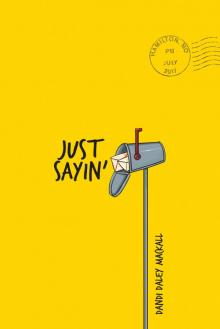 Just Sayin'
Just Sayin'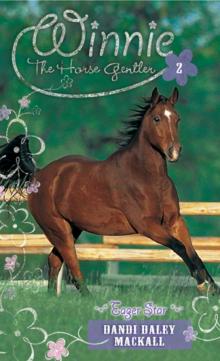 Eager Star
Eager Star Gift Horse
Gift Horse Cowboy Colt
Cowboy Colt Natalie and the Bestest Friend Race
Natalie and the Bestest Friend Race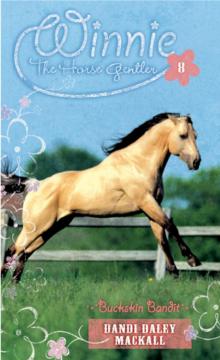 Buckskin Bandit
Buckskin Bandit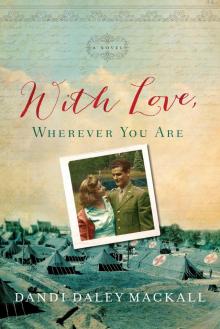 With Love, Wherever You Are
With Love, Wherever You Are Runaway
Runaway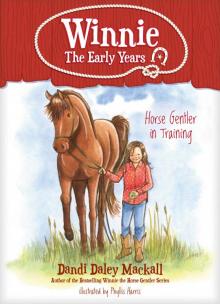 Horse Gentler in Training
Horse Gentler in Training Crazy in Love
Crazy in Love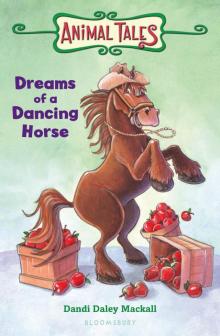 Dreams of a Dancing Horse
Dreams of a Dancing Horse The Silence of Murder
The Silence of Murder The Secrets of Tree Taylor
The Secrets of Tree Taylor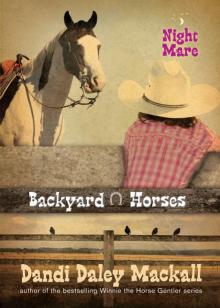 Night Mare
Night Mare Natalie Wants a Puppy
Natalie Wants a Puppy Bold Beauty
Bold Beauty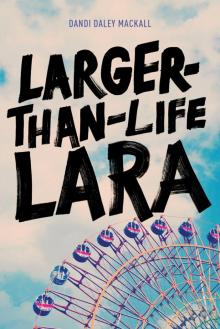 Larger-Than-Life Lara
Larger-Than-Life Lara My Boyfriends' Dogs
My Boyfriends' Dogs Dark Horse
Dark Horse Horse Dreams
Horse Dreams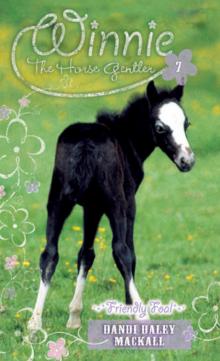 Friendly Foal
Friendly Foal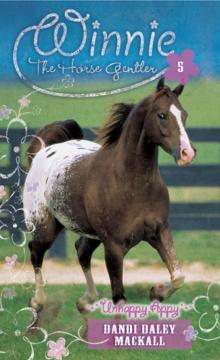 Unhappy Appy
Unhappy Appy Mad Dog
Mad Dog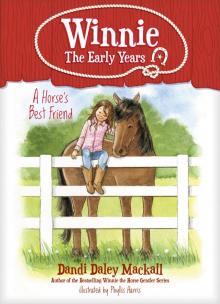 A Horse's Best Friend
A Horse's Best Friend